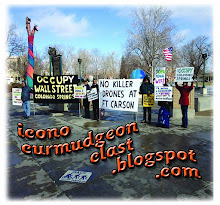The furor over various evangelical Republican candidates making short-sighted comments about rape, violence, pregnancies, and women's bodies, hides a backstory conflict that is simmering during the current campaign season, but could well explode regardless of who wins in November. The statements of Neanderthals like Akin and Mourdock regarding the events that constitute the "will of God" indicate the difficult conundrum faced by some of the devout: If all secular events are due to divine intervention, then that would make God responsible for things like the Aurora shootings, the summer wildfires, and the brutal murders of Jessica Ridgeway and Autumn Pasquale. And that would mean God is a sadist. The easiest alternative to this kind of demented thinking is to be an atheist. But even those of us who stake some claim in divine forces can make things a lot easier by adopting the familiar "God as divine watchmaker" theory. The universe is created in one or many Big Bangs, then the secular world is left to its own devices. In short, shit happens.
Now, I may be in a minority by positing the "Militant Enlightenmentist" theory, which insists that science and rational logic always trumps faith-based and authority-based ways of knowing for events taking place within this physical plane. But I think that a majority of Americans are moving farther and farther away from the notion that secular events reflect the divine will. No, God did not punish New Orleans during Katrina. No, the people who attended the Batman movie in Aurora did not have it coming to them. Most events on the planet are either random or the result of the errors of mortals. To believe otherwise causes more theological problems than it alleviates.
As the Akins and Mourdocks of the world get taken to task for their foolish anti-women screeds, people will show less and less tolerance for claims that something tragic reflects God's will. And the devout will find themselves painted into corners, ready to lash out at science itself as the work of Satan. What happens then? Do we publicly mock those who believe in divine will? Do we invade the altar during a Catholic service, saying, "Transubstantiation? I'll prove to you that the wine and wafer remain the wine and wafer!" There are many atheists of the Dawkins persuasion that might do just that, but I prefer to think of such direct challenges as akin to the provocateur who would kick the crutches away from wounded people merely to watch them fall.
I'm still trying to figure out a kind and respectful way to deal with this emerging problem, but I'm willing to bet that this will be a primary theological debate space in 2013. In a world that operates according to physical laws, the savvy are ready to say that divine will is a figment of a primitive imagination. As a desperate reaction, this will lead to the creation of anti-science coalitions, and may lead the Republican Party to adopt a platform that is more explicitly anti-science. The follow-on question to be asked, of course, is what kind of legitimacy we accord to the power of prayer. At some point, I'll be ready to duck, either from invective hurled from devout mortals, or from lightning bolts hurled by divinities who don't like to be relegated to a clock-making operation.
Thursday, October 25, 2012
Monday, October 15, 2012
Miss Manners' Netiquette for Social Networks - Empath or Asshole?
My friend Michele Clarke posted a New York Times piece on Oct. 15 lamenting the death of all privacy in Twitter circles - using the example of a friend who invited himself to an intimate soiree where he clearly was not on the guest list. Author Nick Bilton made the additional critical point that one need not be on Facebook or Twitter to become the victim of FourSquare, Path, and other applications that operate far more efficiently than the National Security Agency ever could hope to do. As long as your friends include you in their circles, everything about your life is already known. It's been clear for years, if not decades, that fighting for any type of privacy is a hopeless rear-guard action. We might as well report all our activities to marketing data-miners and national intelligence agencies, be our own spies, eliminate the middle-disintermediators, etc. We could look at Bilton's example of the pushy so-called friend in the opening paragraph, and wonder how people could ever get that ugly, but you know what? Long before the Internet existed, there were assholes that were just as pushy. You just didn't have them in your face every day courtesy of the always-on network of 'friends.'
But there is a flip-side issue that Bilton didn't get into. Even if we are the victims of the intrusive personality online, how often do we play perpetrator through passive-aggressive activity of various sorts? I'm talking about far more subtler things than the outright unfriending or blocking of people. I'm talking about the failure of most folks to examine their own behavior for a lack of empathy for how their posts are interpreted by others. The empathic gene is either activated around age 21, or it lies dormant as you become a bigger and bigger asshole. These days, most social networks risk being swamped by assholes, as many seem unfamilar with the concept of how to be empathetic.
Yes, your Facebook or Google+ wall or Twitter dashboard is your own, and you should be able to determine what you say, without censoring yourself for certain communities. If corporations spy on you to learn of your substance abuse or questionable friends, there's always Google+. But it behooves us to go through some basics on how to be a good netizen, and keep in mind what it takes for others to treat you as a reliable (and kind) source.
It takes plenty of fortitude and tolerance to have a bevy of friends of varying political and cultural beliefs, particularly in a bitter election season like this one - but it's better than consistently preaching to the choir. Maintaining a network of friends just like yourself is like living in a "safe" city (say, Santa Cruz or Boulder for a liberal) - it's a good way of avoiding stimulation and surrounding yourself with yes-people. But expanding your posse to those unlike yourself means tolerating posts and counter-posts from people who have nothing in common. If you comment on a post you disagree with, make that comment wry and humorous, and suggest that the person posting may not have full information. Calling names is a way to invoke empty-headed cheerleading. And if you see other comments you don't like, be careful about denouncing the friends of others. If you denounce those that comment directly to your post, you will lose your own friends. If you denounce other commenters on a friend's page, you are likely to be unfriended every time you attempt this.
Maintaining tagging circles or creating special interest groups is a great way to focus discussion on social networks. Sometimes a person can be left off a circle by accident. Sometimes a person asking to join a private group will be ignored without deliberate malicious intent. But often, the slightest snub with a conscious intent behind it will cause real hurt in the victim. Know your thick-skinned friends and your emotionally-needy friends. When in doubt, be inclusive.
Unless you have a page that is a "fan" style page for an artist, band, etc., don't let all the traffic generated by yourself be about you. Narcissism is tedious. Only public relations managers use pages for self-promotion. Talk about yourself, but talk about news or unique cultural things, and be sure to comment on others. The less things are all about you, the more empathy you show. Remember, if the movie of your life is going to be worth watching, you should have a cameo role or a walk-on part. The stars of the movie of your life should be those that influence you.
Belittling should be left for the truly atrocious. It should never be used for the downtrodden or underdog. Sometimes, people will excuse the high-school style clique denigration (that sometimes leads to teen suicide) by saying, "Well, they were only 12 or 14 or 16 or 20 (or 30 or 40 or 50)." If you're on a social network, you've just moved beyond cliques. Act like a fucking grown-up, even if you're 13. Or especially if you're 40.
One aspect of acting detached and somewhat grown up involves addressing every topic with a degree of cool, rational analysis of the Mr. Spock variety. If you are emotionally clinging to tribe or team, using all-caps and lots of exclamation points, and injecting passion into every point you try to bring across, you inevitably act like a bigger asshole in the process. Friends of mine are sick of my mantra, but I'll say it again: If an action comes from your body, or words from your mouth (keyboard), that originate in heart or hormones, filter them through your cortex for a minimum of 10 seconds. Even if you hit your thumb with a hammer. Does this mean we have no passion in our discourse? Hardly. Earlier today, I made a very cruel tweet that deliberately belittled someone and denied his humanity. But I did it after coolly assessing the situation for many minutes, and deciding that my deliberate intent was to deny this person's humanity. Sometimes we do make enemies. But we should do so with detached and delayed passion.
Following these netiquette rules will not protect you from privacy-intruders, trolls, or insufferable assholes. But it just might make you an easier person to deal with. You don't have to smile all the time to be kind. But if you tell someone they are probably mentally disturbed and need to seek professional help in just the right professional tone of voice, they just might listen to you instead of unfriend you. And if they're assholes rather than empaths, well who needs assholes for friends?
But there is a flip-side issue that Bilton didn't get into. Even if we are the victims of the intrusive personality online, how often do we play perpetrator through passive-aggressive activity of various sorts? I'm talking about far more subtler things than the outright unfriending or blocking of people. I'm talking about the failure of most folks to examine their own behavior for a lack of empathy for how their posts are interpreted by others. The empathic gene is either activated around age 21, or it lies dormant as you become a bigger and bigger asshole. These days, most social networks risk being swamped by assholes, as many seem unfamilar with the concept of how to be empathetic.
Yes, your Facebook or Google+ wall or Twitter dashboard is your own, and you should be able to determine what you say, without censoring yourself for certain communities. If corporations spy on you to learn of your substance abuse or questionable friends, there's always Google+. But it behooves us to go through some basics on how to be a good netizen, and keep in mind what it takes for others to treat you as a reliable (and kind) source.
It takes plenty of fortitude and tolerance to have a bevy of friends of varying political and cultural beliefs, particularly in a bitter election season like this one - but it's better than consistently preaching to the choir. Maintaining a network of friends just like yourself is like living in a "safe" city (say, Santa Cruz or Boulder for a liberal) - it's a good way of avoiding stimulation and surrounding yourself with yes-people. But expanding your posse to those unlike yourself means tolerating posts and counter-posts from people who have nothing in common. If you comment on a post you disagree with, make that comment wry and humorous, and suggest that the person posting may not have full information. Calling names is a way to invoke empty-headed cheerleading. And if you see other comments you don't like, be careful about denouncing the friends of others. If you denounce those that comment directly to your post, you will lose your own friends. If you denounce other commenters on a friend's page, you are likely to be unfriended every time you attempt this.
Maintaining tagging circles or creating special interest groups is a great way to focus discussion on social networks. Sometimes a person can be left off a circle by accident. Sometimes a person asking to join a private group will be ignored without deliberate malicious intent. But often, the slightest snub with a conscious intent behind it will cause real hurt in the victim. Know your thick-skinned friends and your emotionally-needy friends. When in doubt, be inclusive.
Unless you have a page that is a "fan" style page for an artist, band, etc., don't let all the traffic generated by yourself be about you. Narcissism is tedious. Only public relations managers use pages for self-promotion. Talk about yourself, but talk about news or unique cultural things, and be sure to comment on others. The less things are all about you, the more empathy you show. Remember, if the movie of your life is going to be worth watching, you should have a cameo role or a walk-on part. The stars of the movie of your life should be those that influence you.
Belittling should be left for the truly atrocious. It should never be used for the downtrodden or underdog. Sometimes, people will excuse the high-school style clique denigration (that sometimes leads to teen suicide) by saying, "Well, they were only 12 or 14 or 16 or 20 (or 30 or 40 or 50)." If you're on a social network, you've just moved beyond cliques. Act like a fucking grown-up, even if you're 13. Or especially if you're 40.
One aspect of acting detached and somewhat grown up involves addressing every topic with a degree of cool, rational analysis of the Mr. Spock variety. If you are emotionally clinging to tribe or team, using all-caps and lots of exclamation points, and injecting passion into every point you try to bring across, you inevitably act like a bigger asshole in the process. Friends of mine are sick of my mantra, but I'll say it again: If an action comes from your body, or words from your mouth (keyboard), that originate in heart or hormones, filter them through your cortex for a minimum of 10 seconds. Even if you hit your thumb with a hammer. Does this mean we have no passion in our discourse? Hardly. Earlier today, I made a very cruel tweet that deliberately belittled someone and denied his humanity. But I did it after coolly assessing the situation for many minutes, and deciding that my deliberate intent was to deny this person's humanity. Sometimes we do make enemies. But we should do so with detached and delayed passion.
Following these netiquette rules will not protect you from privacy-intruders, trolls, or insufferable assholes. But it just might make you an easier person to deal with. You don't have to smile all the time to be kind. But if you tell someone they are probably mentally disturbed and need to seek professional help in just the right professional tone of voice, they just might listen to you instead of unfriend you. And if they're assholes rather than empaths, well who needs assholes for friends?
Tuesday, October 9, 2012
Carolyn Srygley-Moore: Trauma and the Unified Vision
Fans of Carolyn
Srygley-Moore already questioning her mere mortality no doubt had more reasons
to believe in her superhero status in September, as she began posting
impressive pencil works even as she expanded her posting of shorter fragmentary
poetic works. If we assemble the text
and visual jigsaw puzzle pieces scattered over Facebook pages, a fairly
coherent picture emerges. Nevertheless,
I chased Carolyn down to find out if she sees the same complex Mandelbrot patterns
in her memories that seem to be left in her wake, bread crumbs for the lost
children.
Many people who
suffer significant trauma in childhood years, or in post-college crashes,
preserve blank pages in the internal mental narrative, if only as a form of
self-preservation. Srygley-Moore will
have none of that. Extended hospital
trips might leave hazy vapor trails at times, but the life story linearity is
there, just under the surface.
Experiencing the violence of a father who lived through World War 2
atrocities did not cancel out the memories of older brothers and treehouses
during childhood, nor the images of a kind mother who remained an ally to the
present day. CSM said she even has clear
memories of first finding her visual-arts voice at age 7, though after five
years of drawing and painting in her younger childhood, she gave it up at
adolescence. She returned through later
teen years, but abandoned art at 18 when she discovered her intense love for
language, and did not return to the voice of the charcoal and colored pencil drawing
until the 21st century.
“I started visual art again because I looked
through a magazine my poetry was published in, and realized the visual art
published there was something I was capable of doing,” she said. “I went from there, and verbally contracted
with A Razor, the editor/publisher of
my upcoming book on the Miracle series of poems, to do the cover of the
book. It was baby steps from there. I bought a sketchbook, charcoal, and colored
pencil, and went at it. It feeds into my
writing, very much so. It is a more
relaxed form of art, for me, and I just have an absolute blast going after the
mix of dream and realism that comes to me.”
Srygley-Moore’s poems carry the most bite
when she addresses the betrayal of family and others, because she considers the
transgression of trust a critical issue.
She often asks herself, would the perpetrator of violence, the betrayer
of trust, act the same if forced to confront the long-term effects on victims
and others of the violent act? At the
same time, there are no blank pages allowed in the processing of memory. Does that bring an element of catharsis to
her poetry? She said that her work is
achieved under a conscious discipline that leaves pure catharsis “a little
strained.”
Recent fragment-poems have arisen in order
to accommodate the need to write while at work, since a longer form would be
too difficult to bring to fruition, while her own handwriting, Srygley-Moore
said, is illegible. Because the
fragments are delivered directly online, they have attracted the attention of
outsiders, including online publishers Bone Orchard, and Srygley-Moore’s friend
Lee Tromboudin, who would like to set some of the fragments to music.
Seeing the audience grow for art and
fragmentary poems, as well as her more traditional work, has left Srygley-Moore
feeling more confident that she is expanding the definition of translator. More and more fans seem to expect a daily
poem or two with their morning coffee, which helps drive a sense of obligation
to a fervent, if modest, fan base.
Broadening her
genres and base of expression has made Srygley-Moore a happier person, she
freely admitted. The addition of visual
art in recent months "opens apertures, wormholes, distances that otherwise are inaccessible," she said. "I believe that to show how far I have come, in various avenues as a woman with bipolar disorder, who has managed to overcome PTSD, is something good for those still stuck in the trenches.”
Subscribe to:
Posts (Atom)









